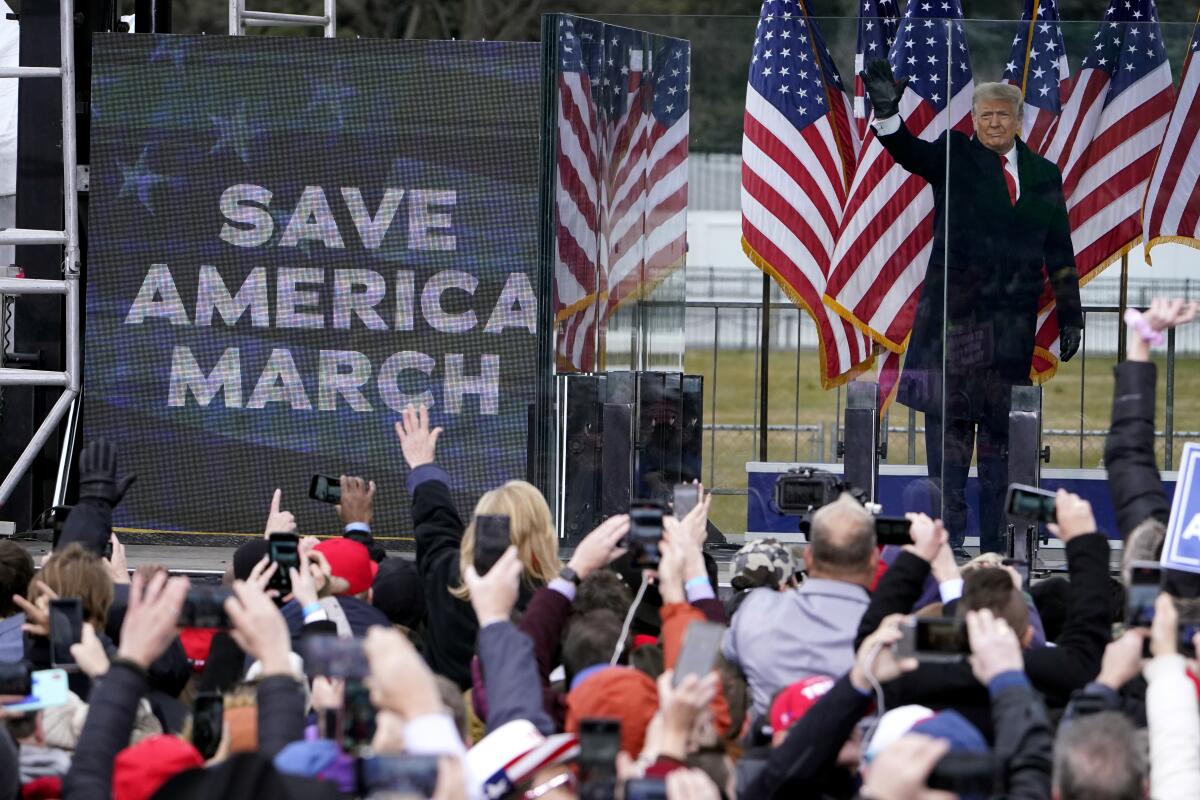U.S. Supreme Court refuses a fast-track ruling on Trump’s claim he is immune from criminal charges

WASHINGTON — In a setback for special counsel Jack Smith, the U.S. Supreme Court on Friday turned down his request for a fast-track ruling on whether former President Trump may be prosecuted for having allegedly conspired to block then-President-elect Biden from being certified as the winner of the 2020 election.
Without comment or dissent, the justices denied Smith’s request.
The D.C. Circuit Court has said it will consider the issue in early January, but the high court’s action is likely to delay a final resolution of the legal question.
Trump’s lawyers said the criminal charges should be thrown out on the grounds that a former president cannot be charged with a crime for his “official acts” while in the White House.
But the special counsel said ex-presidents do not enjoy “absolute immunity” for past crimes, and he urged the justices to rule quickly on the issue so Trump’s trial can begin March 4.
In his appeal seeking a quick ruling, Smith did not mention the election year calendar or Trump’s standing as the front-runner for the Republican presidential nomination. But many conservatives and Trump supporters said the Biden administration and the special counsel waited two years to bring a criminal prosecution and they bear the responsibility for any delays now.
The immunity claim is one of two major legal questions involving Trump’s conduct after losing the 2020 election that could have a significant impact on his bid to reclaim the presidency next year.
The justices are likely to be asked soon to rule on whether Trump can be disqualified and removed from the ballot for having “engaged in insurrection,” a violation of the 14th Amendment.
Trump’s lawyers are expected to appeal a decision of the Colorado Supreme Court that would remove Trump from the primary ballot there.
The special counsel did not charge Trump with inciting an insurrection. Instead, he indicted the former president with defrauding the United States and voters and with conspiring to obstruct an official proceeding.
The Constitution does not say directly whether a president can be prosecuted for crimes after leaving office, nor has the Supreme Court ruled on the issue. That’s because no prior president has been indicted for crimes.
The impeachment clauses say a president can be removed from office if two-thirds of the Senate votes to convict him of treason, bribery or “other high crimes and misdemeanors.” Trump was impeached twice by the House, but not convicted by the Senate.
In February 2021, 57 senators voted to convict him for inciting an insurrection that led to the mob attack on the Capitol, but 67 votes were required for a conviction. That verdict could have disqualified Trump from holding office again.
While impeachment is not a criminal proceeding, the Constitution says “the party convicted shall nevertheless be liable and subject to indictment, trial, judgment and punishment, according to law.”
The special counsel says that provision confirms that a president or any other high official may be prosecuted for a crime after an impeachment.
Trump’s lawyers argue the reverse. They say that because the former president was not a “party convicted” in his second impeachment trial, he cannot be indicted and tried for the same charges now.
The closest Supreme Court precedent on presidential immunity involved President Nixon, but not for the more famous dispute over the Watergate tapes. Four years after he left office, Nixon was sued by a Pentagon whistleblower who was dismissed in 1970 for having revealed huge cost overruns.
In Nixon vs. Fitzgerald, the high court ruled in a 5-4 vote that “a former president of the United States is entitled to absolute immunity from damages liability predicated on his official acts.”
The majority said this shield from lawsuits is based “on the president’s unique office and is rooted in the constitutional tradition of the separation of powers.”
Writing in dissent, Justice Byron White questioned how far such a ruling could extend. If the principle of presidential immunity is based on the Constitution, he said, it would mean Congress “cannot provide a remedy against presidential misconduct, and the criminal laws of the United States are wholly inapplicable to the president. ... I find this approach completely unacceptable,” adding it “places the president above the law.”
More to Read
Get the L.A. Times Politics newsletter
Deeply reported insights into legislation, politics and policy from Sacramento, Washington and beyond. In your inbox three times per week.
You may occasionally receive promotional content from the Los Angeles Times.










